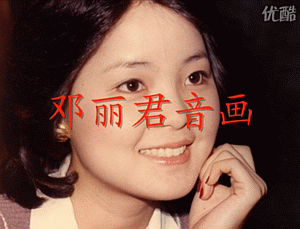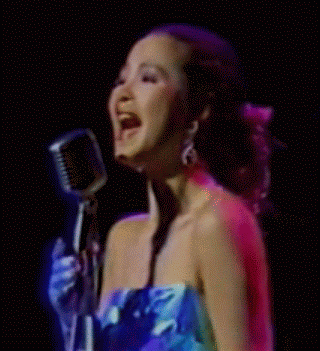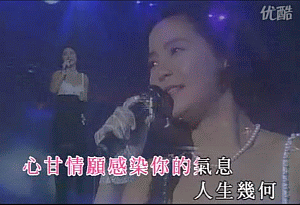Teresa Teng |
|||||||
| Teresa Teng is a Taiwanese idol whose 30 year career made
her the first truly International artist across all of Asia. Although
a highly skilled player of classical Chinese instruments, it was her voice
that brought her wide acclaim. Her road to stardom lead her first to Hong Kong, where she became an adopted daughter. She also spent time in Japan, recording several albums in Japanese. However, with the opening of Mainland China, her star was soon the brightest in Beijing Unfortunately her career was cut short and she died in 1995. However, her songs and shows are still widely broadcast today. She was the first to break through international barriers, and this is perhaps her legacy to all Asian musicians. |
|||||||

|
Teng was known for her folk songs and romantic ballads.
Many became standards in her lifetime, such as "When Will You Return?"
(何日君再來) and "The Moon Represents My Heart" (月亮代表我的心 / Yue Liang
Dai Biao Wo De Xin). She recorded songs not only in her native Mandarin
but also in Taiwanese, Cantonese, Japanese, Vietnamese, Indonesian, and
English. Teng, a lifelong sufferer from asthma, died in 1995 from a severe respiratory attack while vacationing in Thailand. She was 42. |
||||||
Teresa Teng (January 29, 1953 – May 8, 1995) (traditional Chinese: 鄧麗君; simplified Chinese: 邓丽君; pinyin: Dèng Lìjūn; Wade–Giles: Teng Li-chun; Pe̍h-ōe-jī: Tēng Lē-kun, Japanese: テレサ・テン), was an immensely popular and influential Chinese pop singer from Taiwan. Her ancestry is from Daming, Hebei, China. Teresa Teng's voice and songs are instantly recognized throughout East Asia and by virtually all Chinese speaking people. Early life Teresa Teng was born in Baozhong, Yunlin County, Taiwan, to a mainland Chinese family from Hebei. She was educated at Ginling Girls High School. As a young child, Teresa won awards for her singing at talent competitions. Her first major prize was in 1964 when she sang "Visiting Yingtai" from Shaw Brothers' Huangmei opera movie, "The Love Eterne" (梁山伯與祝英台), at an event hosted by Broadcasting Corporation of China. She was soon able to support her family with her singing. Taiwan's rising manufacturing economy in the 1960s made the purchase of records easier for more families. With her father's approval she quit high school to pursue singing professionally. Career Teng's singing style conveyed simplicity and sincerity. Yeh Yueh-Yu, a professor of Cultural Theory at the University of Southern California said, "It was the sweetness in her voice that made her famous. She had a perfect voice for folk songs and ballads, and she added traditional folk song styles into Western-style compositions.
In the early 1980s, continuing political tension between mainland China and Taiwan led to her music, along with that of other singers from Taiwan and Hong Kong, being banned for several years in mainland China as too "bourgeois". Her popularity in China continued to grow nonetheless thanks to the black market. As Teng songs continued to be played everywhere, from nightclubs to government buildings, the ban on her music was soon lifted. Her Chinese fans nicknamed her "Little Deng" because she had the same family name as Deng Xiaoping; it was said that Deng the Communist leader ruled China by day, but that Deng the singer ruled China by night.
Teng performed in Paris during the 1989 Tiananmen student protests on behalf of the students and proclaimed her support for democracy. On May 27, 1989, over 300,000 people attended the concert called "Democratic songs dedicated to China" (民主歌聲獻中華) at the Happy Valley Racecourse in Hong Kong. One of the highlights was her rendition of "My Home Is on the Other Side of the Mountain." Though Teng performed in many countries around the world during her career, her hopes of performing one day in mainland China never materialized. The Communist Party of China eventually invited her to do so in the 1990s but she died before the opportunity came. Her songs have been covered by a number of singers, including Faye Wong who released a tribute album (Decadent Sounds of Faye, 菲靡靡之音, 1995) of Teng's popular hits. In May 2002, the wax figure of Teng was unveiled at Madame Tussauds Hong Kong. China Expats wish to thank Wikipedia, from whom much of the above was sourced and edited: http://en.wikipedia.org/wiki/Teresa_Teng Wikipedia have a lot more information and several different links at the bottom of their page. Media Video Link 1 邓丽君: 但愿人长久(高清晰) Video Link 2 邓丽君:我只在乎你 Official website: http://www.teresa-teng.org/ |
|||||||

